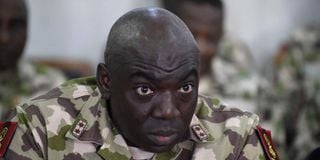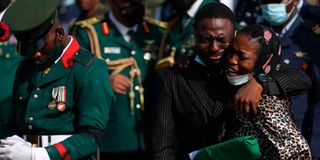Premium
Ibrahim Attahiru: Nigerian general who honed his skills in Nairobi

In this file photo taken on October 4, 2017 Commander of the Operation Lafiya Dole Major General Ibrahim Attahiru speaks at the army headquarters, in Maiduguri, Borno State in northcentral Nigeria.
What you need to know:
- As Chief of the Army Staff, he was a powerful and influential military officer, controlling both a significant chunk of resources and all ground troops. In Nigeria, his death was both a personal loss to family and to the military profession.
Nigeria is still mourning the death of an army general who honed some of his skills in Nairobi, Kenya, even after replacing him this week.
President Muhammadu Buhari’s government on Thursday named Farouk Yahaya, the Threatre Commander of Counter-terrorism, a counter-insurgency unit code-named Operation HADAKIN KAI.
A major-general, Yahaya belonged to the same cohort as his predecessor Lt-Gen Ibrahim Attahiru, as they both belong to a class known as Course 35. How he takes on the job will determine whether he will be able to fit into Attahiru's shoes.
Attahiru had been the Chief of the Army Staff (COAS) for only five months when he and 10 of his colleagues were killed on their way to a military pass-out parade in Kaduna. Their aircraft, a Nigeria Air Force Beechcraft Super King 350, reportedly entered bad weather on May 21, crashing and killing everyone on board.
His death has been felt across the continent and as far as Nairobi where he sharpened his military strategy skills.
The flags of the Nigerian Army and Nigerian Air Force are seen at half-mast during a military burial ceremony to honour the officers killed in a plane crash, at the National Military Cemetery, Abuja, Nigeria on May 22, 2021.
Military student
Back in 2010, Attahiru was in Nairobi as a military student at the National Defence College in Nairobi. He was just a colonel then but his classmates in that course remember him as a strategist “from the outset.”
“He spoke fondly of Nigeria. He was clearly a patriot ready to defend his country,” a Kenyan soldier who attended the class with him told the Nation.
“You could see he loved his job and that he was a proud soldier,” he added.
Attahiru was among the dozens of Kenyan and African security officers gathered at the National Defence College to train under a faculty led by then NDC Commandant Lt-Gen Joseph Kasaon, who would later become the vice-chief of Kenya Defence Forces.
Lt-Gen Attahiru was also educated at the Agha Khan University in Nairobi, where he honed his diplomacy skills after earning a diploma in international relations.
In Nigeria, he had trained at the Nigerian Defence Academy; Armed Forces Command and Staff College; and Nigerian Army School of Infantry, adding to his three-decade experience in the battlefield.

Nigerian Army personnel carry the caskets of Nigerian Chief of Army Staff, Lieutenant General Ibrahim Attahiru and 10 military officers who died in an air crash at the National Military Cemetery in Abuja, on May 22, 2021.
Dependable soldier
President Buhari told the country he had lost a dependable soldier.
When he appointed him in January, Buhari told the country, where more than 40,000 people have been killed by insurgents, that “I have taken responsibility as commander -in-chief for them to go out into the fields and every part of the country, to ensure peace and security".
He said: "I have accepted responsibility for all actions taken in fulfilment of the mandate to secure Nigeria.”
Attahiru replaced Lt-Gen Tukur Buratai who had served as Chief of Army Staff since July 2015.
And his dexterity as COAS would be needed to end the rising cases of terror attacks including kidnappings.
With the death of the 55-year-old soldier, Buhari felt the much-needed institutional experience had been destroyed.
“[I am] deeply saddened by the air crash that claimed the lives of the Chief of Army Staff and other military officers. All of them are heroes who paid the ultimate price for peace and security in the land,” Buhari tweeted on May 22.
“This crash is one mortal blow to our underbelly, at a time our Armed Forces are poised to end the security challenges facing the country. My condolences to the families of the deceased, the entire military, and all Nigerians. The deaths of these officers will not be in vain.”
Rich experience
His appointment as Chief of Army Staff, was based on his experience fighting banditry and terrorism, which Buhari said they would “keep in mind that the nation is looking to them for rapid relief.’’
Attahiru, had served in several capacities in the army, including the Theatre Commander of Operation LAFIYA DOLE (the Counter-Terrorism and Counter-Insurgency Outfit in North-Eastern Nigeria), where he brought relative stability to the region with the surrender of several Boko Haram combatants.

Families of a military officer who was killed alongside 10 other military officers including the Nigerian Chief of Army Staff, Lieutenant General Ibrahim Attahiru, react during the burial ceremony at the National Military Cemetery in Abuja on May 22, 2021.
Born in Doka, Kaduna North Local Government Area, Attahiru, started as an officer cadet training in January 1984 and was commissioned as a Second Lieutenant in December 1986 as an Infantry Officer.
He was also, at one time, the Operations Officer and Company Commander in ECOMOG Operations in Liberia, as well as Commanding Officer 146 Battalion Nigerian Army (Operation HARMONY IV) in the Bakassi Peninsula and as Commander 13 Brigade Nigerian Army (Operation PULO SHIELD).
As Chief of the Army Staff, he was a powerful and influential military officer, controlling both a significant chunk of resources and all ground troops. In Nigeria, his death was both a personal loss to family and to the military profession.
As he embarked on the trip to Kaduna, where he was to attend a pass-out parade, he had called his wife Fati to alert her of the visit. Earlier reports had erroneously indicated that Mrs Attahiru was aboard the ill-fated aircraft. In fact, she had been on the ground at the airport waiting for him.
His aide, Maj LA Hayat had also called his mother who resides in Kaduna that he would pass by. Flt-Lt AA Olufade had only come from a honeymoon several weeks earlier. His co-pilot, Flt-Lt TO Asaniyi had alerted his friends of a wedding due sometime this year.
For Nigeria, Attahiru’s elevation was Buhari’s latest attempt to fight terrorists. With the 10 gone, the country may start planning again.
Mr Adekunle Omo-Aje, National Chairman, Conference of Nigeria Political Parties (CNPP), said remembered Attahiru as one military officer who had “total commitment… despite many challenges facing the nation.’’
Senate President Ahmad Lawan, said the death came at a time of fresh momentum in the nation’s war against insurgency, banditry and other violent crimes.
The US Mission in Nigeria said the incident as coming at the difficult time across Nigeria, and when peace and security is needed most.
Additional Reporting by Aggrey Mutambo





